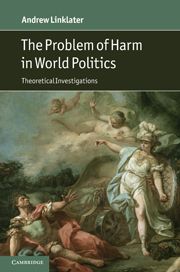Book contents
- Frontmatter
- Contents
- Preface
- Introduction
- 1 The concept of harm
- 2 The harm principle and global ethics
- 3 Harm and international relations theory
- 4 The sociology of civilizing processes
- 5 Historical sociology and world politics: structures, norms and emotions
- 6 Civilizing processes and international systems
- Conclusion
- Bibliography
- Index
3 - Harm and international relations theory
Published online by Cambridge University Press: 05 June 2012
- Frontmatter
- Contents
- Preface
- Introduction
- 1 The concept of harm
- 2 The harm principle and global ethics
- 3 Harm and international relations theory
- 4 The sociology of civilizing processes
- 5 Historical sociology and world politics: structures, norms and emotions
- 6 Civilizing processes and international systems
- Conclusion
- Bibliography
- Index
Summary
The widening of the circle of those with rights under ‘the principle of humaneness’ indicates that there have been advances in the moral spheres of international politics, but whether there has been overall progress is another matter. The answer to that question depends on how far such progressions lag behind changes in other areas that restrict their scope, limit their influence, and have the ability to throw them into reverse. The idea of the ambiguities of interconnectedness captures the main issue here which is that advances in learning how to co-exist harmoniously and to assist the vulnerable in distant places have to be viewed alongside the evolution of the capacity to inflict ever more devastating forms of harm on more and more people, and over greater areas. Their relative speed of development – the rates of acceleration or deceleration at different points in time, and the extent to which moral progressions have ever kept pace with revolutions in the power to injure – is a central issue for the analysis of the problem of harm in world politics.
One of the bleaker interpretations of the history of interconnectedness states ‘that war is in a sense the habitual condition of mankind, that is to say that human blood must constantly flow somewhere or other on earth; and that for every nation peace is no more than a respite’ (de Maistre 1965: 61).
Information
- Type
- Chapter
- Information
- The Problem of Harm in World PoliticsTheoretical Investigations, pp. 112 - 153Publisher: Cambridge University PressPrint publication year: 2011
